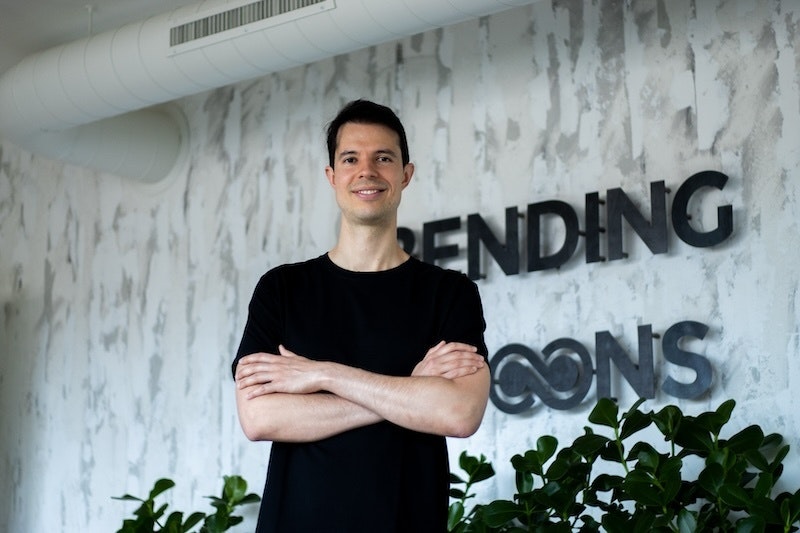Italian tech unicorn Bending Spoons announced it’s agreed to acquire the remains of one-time event tech darling Hopin on Tuesday, for an undisclosed amount.
After recently abandoned talks to acquire US video streaming giant Vimeo, Bending Spoons moved closer to home by targeting what’s left of Hopin’s video streaming and community assets.
Although Bending Spoons declined to confirm the price of the deal to Sifted, it’s likely these assets have been sold at a fraction of the price they were worth when Hopin bought them at the peak of the market in 2021. Hopin paid $250m for livestreaming platform StreamYard, four times the amount it sold its own flagship events product to RingCentral last year, for example.
It’s Bending Spoon’s third acquisition of 2024. The tech company started the year with the acquisition of US-based events platform Meetup in January, and sealed a deal with US media conglomerate IAC later that month to buy Mosaic Group’s suite of mobile apps for over $100m.
It comes after Bending Spoons boosted its coffers for acquisitions in February with a $155m megaround from some of the world’s biggest growth investors, including Duolingo backer Durable Capital and Amazon investor Baillie Gifford. At the same time, the company chose to disclose its post-money valuation for the first time — $2.55bn, crowning it Italy’s third startup unicorn, by order of announcement.
“An 11-year overnight success”
All this first quarter news has catapulted the previously under the radar Italian firm into the global tech limelight.
“I guess we’re an 11-year overnight success,” CEO Luca Ferrari tells Sifted, joking about the company’s recent emergence from relative obscurity to front and centre within the European tech hype machine.
After Ferrari and his cofounder Matteo Danieli cashed in $40k from their previous failed startup Evertale, they founded Bending Spoons in 2013. They quietly bootstrapped the company for almost a decade before raising their first equity financing round in September 2022 — $340m from global investors, including Hollywood actor Ryan Reynolds. Up until that point, reinvestment, secondaries and debt kept the wheels turning at the company — Ferrari says that overall it’s raised more than $500m in debt to date.
Profitable since day one

Unlike many European tech unicorns, Bending Spoons is currently flush with cash. It’s a super rare beast in European startup land in that it’s been “profitable since day one”, CEO Luca Ferrari confirms to Sifted, without sharing exact figures.
Later this month, the startup will announce its FY2023 revenues soared 2.5x to $392m, up from $162m a year earlier, Sifted can exclusively reveal. The company is forecasting sales will shoot up further to $500m in 2024.
Covid was a boon for the company. In April 2020, the Italian government chose Bending Spoons to design and develop the country’s Covid contact tracing app, Immuni. This helped accelerate the number of users it now counts across its apps — a figure that recently hit 500m, according to the company. When Bending Spoons raised its first equity round in 2022, it already had $100m in revenues.
“As we scale, we unlock certain economies of scale and a lot of the costs become more efficient because our central functions can serve several products rather than needing to be built from scratch,” Ferrari says.
“This means our margins have improved over time. But 2023 saw accelerated revenue growth for us — a good chunk of this came from our acquisitions, and a good chunk came from organic growth of our existing products.”
“If Berkshire Hathaway and Google had a baby”
Unlike the usual AI and fintech startups that dominate journalist and investor attention, Bending Spoons is hard to categorise.
In the startup’s home city Milan, local press and finance workers enjoy debating whether Bending Spoons can even call itself a tech company. They argue the active acquirer is more like a modernised private equity play.
This debate frustrates Ferrari. “If the definition of a technology company is one that invests a large part of its cash flow into research and development, then it’s a resounding yes,” he tells Sifted.
After their previous startup Evertale “failed” on product-market fit, Ferrari says he and his cofounder decided to take a very different approach with Bending Spoons. Rather than building a product itself, the company acquires digital tech products from other companies that have already proven a fit with their market, but that Bending Spoons thinks has “substantial untapped potential”, Ferrari explains. They then focus on improving their product and tech. Ferrari says this company strategy has remained unchanged for 11 years.
The only sector the company won’t touch is gaming — and it’s sceptical about the currently “ridiculously over-valued assets” in AI, Ferrari says, preferring to stick to the company’s applications of AI to enhance the products it acquires.
“Our ambition is to build one of the most significant technology companies in the world through this particular strategy — which I guess you could say is a little bit like if Berkshire Hathaway and Google had a baby,” Ferrari tells Sifted.
“We’re a hybrid. We have the capital allocation engine and the technology operator engine, and as far as I’m aware, that’s unique.”
Ferrari says one portfolio product, AI-powered image maker Remini, now has 90m monthly active users.
“To my knowledge, it’s the second most-used generative AI product in the world. So if that doesn’t make us a tech company, I don’t know what does,” Ferrari says.
Three-quarters of Bending Spoons’ employees (300 of 400) are technical hires, he tells Sifted, and he doesn’t remember ever hiring anyone from a traditional finance or private equity background.
A ruthless approach

Bending Spoons is known for its ruthless approach when it comes to improving the performance of its acquisitions. Its 2023 Evernote acquisition is a case in point. When Bending Spoons acquired the company last year, it boasted $100m in recurring revenue and millions of customers — but it had been unprofitable for years.
By midway through 2023, Bending Spoons had laid off nearly all of Evernote’s 250 employees in the US and Chile, and moved the company’s remaining operations to Europe — i.e., in-house to its centralised team.
At the same time, Bending Spoons also reduced Evernote’s free plan offering to encourage users to sign up for paid plans. It hiked annual prices for paid personal and professional plans to $129.99 and $169.99 respectively — around double what they’d been since 2016. Although this caused an uproar on customer forums, Ferrari is unashamed of the company’s “long-term view” when it makes decisions on new assets.
“Yes, a price increase will generally lead to a loss of customers,” he says. “But if you can do it right, it will be a net positive when you also consider that you're retaining some of the more committed customers, which then contribute greater revenues that you can reinvest in the product.”
He tells Sifted that Evernote is now a profitable, sustainable business.
But despite this approach to acquisitions, Ferrari says there’s one area that Bending Spoons hasn’t been aggressive enough — he regrets taking external investment so late. “I think we made a mistake as a management team not to tap into that resource earlier,” Ferrari tells Sifted.
The sky-high valuations given to tech companies in the 2021 bull market meant that “the opportunity was less pronounced” for Bending Spoons as an acquirer, he says. When valuations began to normalise in 2022 and 2023, the company “saw a bigger opportunity to press deeper on the accelerator,” he says.
Italy’s first startup IPO
Thanks to its consistent profitability and the global growth investors that have joined its cap table, Bending Spoons is a strong contender for one of Europe’s next tech IPOs.
“It's more likely than not that we will go public in the not-too-distant future,” Ferrari tells Sifted, adding that the timing will be determined “more by the pipeline of acquisitions than by the market”.
“As we’re so based on acquisitions, being publicly traded affords certain advantages,” he says.
An IPO would be a huge moment for Italy’s nascent tech scene, which lags behind that of neighbouring countries France and Germany.
Bending Spoons has already had a significant influence on local perceptions of tech — especially when it comes to employment benefits. The salaries it offers employees are more in line with the UK and US than Italy’s standard, and its company culture is “more get shit done, more Anglo Saxon than Italian,” one early employee tells Sifted.
Now, local investors tell Sifted that if Bending Spoons were to choose a double listing in Italy and the US, it would send a much-needed signal to the country’s corporate world and government that investing in tech is vital for Italy’s future economy.
Although the company has not yet decided on a location for a potential IPO, Ferrari has chosen to keep the parent company and head office in Italy.
“It’s part of our broader mission to prove that you can build one of the most significant technology companies in the world with roots in an unlikely place — like Italy,” he says.
Ferrari hopes that a Bending Spoons exit success would provide inspiration to budding entrepreneurs in Italy, as well as encouraging existing local companies to “be more ambitious”.
“I’m not saying we’re going to build the next Silicon Valley in Italy, but if we could move the needle even slightly, I think there’d be great value in that,” he says.


